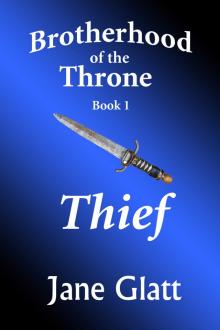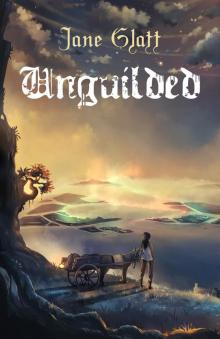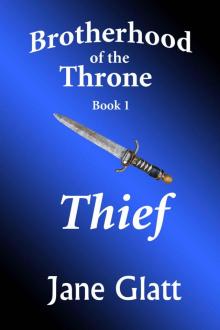- Home
- Jane Glatt
Pirates & Privateers Page 3
Pirates & Privateers Read online
Page 3
“Ready and flip!”
Everyone on Dag’s side of the boat raised their arms and shoved the dinghy high into the air; at the same time the opposite side dipped low, allowing the boat to flip over and expose the ribs to the sky. Copying her neighbour, Dag crawled underneath, bracing her back against the keel of the dinghy.
Two more sailors joined them underneath the dinghy: they all walked towards the side of the ship before straightening their legs to lift the dinghy up and over the gunwale. Hands reached out as the rest of the sailors kept the dinghy clear. Once the dinghy was over the side, Dag stepped away to watch it be lowered to the water. After a quick check to make sure she hadn’t been noticed, Dag slipped away from the crowd.
She needed to figure out how to get into the dinghy and ashore. She thought the small boat would hold about ten people. She guessed there were thirty or so sailors on board. How many of them needed to stay on the ship and how many would go ashore?
She looked towards the shore: there was a small community on Strongrock Island, but really all she knew about it was that it was not part of either Ostland or the three Fair Seas Treaty countries.
She wasn’t a very strong swimmer, but the dock looked close. She might be able to make it that far, but then what? Haul herself out of the sea and wander around dripping wet until she found Inger? This was the only ship in this harbour: everyone would know she’d stowed away on it. Would they help her if they knew how she’d gotten here?
The dock led to a huddle of wooden buildings: most were small but there were a couple of larger two-storeyed structures. The whole settlement seemed to be wedged into a strip of land at the bottom of a steep hill that led up to a plateau of some kind. At least from here, it looked like it flattened out on top.
She’d be better off getting to Strongrock by boat, she decided, assuming that the dinghy would make more than one trip.
Sailors hauling crates arrived on deck, bringing goods up from the hold, and Dag walked past them with her head down. She found a shadow and settled into it as the goods were lowered over the gunwale to the dinghy below.
A few sailors without burdens climbed over the gunwales. One tossed a rope down and laughed at her mates. “I’ll save some seats for ye at the Mast,” she called before disappearing from Dag’s view.
Dag relaxed: it seemed that more sailors were expected to go ashore, if that sailor was planning on seeing them later. Still, she was nervous until more crates were brought up from below indicating that they were making at least one more trip. A pair of sailors wandered past her, muttering about being forced to eat on board rather than joining others at the tavern.
The deck had cleared a little, and now only the sailors who were carrying crates remained. Dag made her way to the pile of goods, trying not to stare at the Fair Seas Treaty Alliance seal on a wine cask that was waiting to be taken ashore. It was possible that these goods had been purchased fairly, and anyway, that was not her business. She was here to find Inger, make sure she was safe, and take her home.
IT WAS DUSK by the time the dinghy was loaded for its second trip. Dag grabbed the edge of a wooden crate as a sailor hauled it to the side of the ship. Only a few sailors were still helping to load the small boat, and Dag assumed that this would be the last trip ashore tonight.
She helped hand the crate to a sailor who straddled the gunwale, and then she climbed over the side of the ship. The rope ladder swayed as she stepped down it. A hand steadied her as her bare foot hit the wood of the boat.
“Last oar’s free,” a man said to her. He held a lamp up and gestured to an empty seat.
Dag nodded and crab-walked over to it and sat down in front of the unmanned oar, shifting her boots, which were still tucked into her shirt.
A moment later, the sailor who’d spoken to her waved up at the ship.
“I’ll have a drink for you,” he called out, and the rest of the sailors in the dinghy laughed.
The sailor in charge turned to the rowers. “Sit up, now row!” As one, everyone leaned forward, reaching with their oars. Dag did her best to imitate them but she’d never rowed as part of a large crew before and her boots shifted every time she moved. Her oar stuck in the water, and she dragged at it, trying to get it out. Finally, she was able to raise it out of the water.
“New, are you?” the man in charge asked from her side. He’d hung the lamp from a pole and it swung wildly with each stroke of the oars.
“I guess it’s obvious,” Dag said. “Sorry, I really thought I could do this.”
“You’ll get the timing eventually but for now, hold it like this.” He made fists and bent his arms so that his elbows were at his sides. “That’ll keep your oar out of everyone else’s way.”
Dag copied him, concentrating on holding the oar steady and out of the water.
“We don’t get many new ones your age,” the man said. “What brought you?”
“My sister,” Dag replied. “I’m here to see her.” Joosep always said it was better to tell the truth—just not all of it. You never knew what Trait someone might have.
“There are other ways to get here.”
“Not this fast,” Dag said.
“True.” He stood up and stared ahead. “You do look familiar. A young woman came in last week. I think she’s at the Broken Mast.”
“Thank you,” Dag said. She looked up at him, trying to read him. The planes of his face came into and out of relief with every sway of the lamp. “Why are you helping me?”
“I don’t think you mean harm,” he said. “Heya!” he called out and waved to someone in the distance. “Toss us a line. Hold up,” he said to the rowers.
The jerky movement of rowing stopped, and Dag chanced a glance behind her: a dock was lined with lamps and a couple of people stood at the edge. A rope flew through the air and the woman in the bow grabbed it.
The dinghy was towed in, and Dag followed orders as they shipped the oars and unloaded the goods. The sailor in charge waved her off when she bent to pick up a wooden cask from the dock.
“You go on,” he said. “Find your sister. The Broken Mast is that way.”
“Thank you,” Dag said. She nodded and headed along the dock. The sailor had been nice: he hadn’t reported her to anyone and had actually told her where to find Inger, but she didn’t think he was only being nice. The pirates might not want her to know where they stored their goods, especially if they had been stolen. But she was fine with that. All she wanted was to find her sister.
The buildings closest to the dock lined a square but they were dark: the noise and lights were from the two larger buildings—the tavern and what looked like an inn—that each bore signs that said The Broken Mast.
Dag headed past the inn and pushed open the door to the tavern, pausing just outside to scan the smoky interior. She heard a familiar laugh and stepped in. This was the right place.
Inger stood beside a table full of rowdy drunks. She leaned over them and placed mugs on the table.
After setting the mugs down, her sister picked up some empty ones. What in all of Nyorden was Inger doing? Was she working in the tavern? Coins were handed to Inger, and she grabbed them before threading her way through the crowded tables to the bar.
Dag took a more direct route.
“Another three mugs of barley ale,” Inger said to a woman who stood behind the bar.
“You’re a barmaid,” Dag said.
“Dagrun!” Inger squealed. She set her tray down on the bar and turned and hugged her. “I knew you’d come,” she whispered. “I knew you would.”
“But you’re all right?” When Dag felt her nod, she squeezed Inger until she gasped. “Then why did I have to track you down?”
“Later,” Inger said. She stepped back from Dagrun. “Ursa,” Inger turned to the woman behind the bar. “This is my sister, Dagrun. Dag, meet Ursa Ozlinch, my employer. And friend, I hope.”
“The one you’ve been expecting?” Ursa peered across the bar at Dag. “I see a likeness, but twins? That I
don’t see.”
“Well, it’s true,” Inger said. She turned and winked at Dag, who nodded.
No one ever believed they were twins. That was one reason why it had taken so long for Joosep to hear about them despite spending years looking for twins with Traits. Inger was Seen: everyone assumed that she was the older—and prettier—sister. And Dag was overlooked. Not that she minded: she always felt better not being the centre of attention. And if that was due to her Trait, she didn’t care.
“If I’m a paying customer that means you have to serve me,” Dag said. She heard Ursa snort with laughter.
“Of course!” Inger said. “Find a seat. I’ll just bring you whatever I think you’ll like, right?”
“No,” Dag said. Now that she’d found Inger, she was going to make her pay for all the worry she’d caused. And the trouble she’d be in with Joosep for leaving without telling him. “I need to know what’s on the menu.” She paused and looked around the room. Most customers were drinking but a few had plates or bowls in front of them. “And what can be made special.”
Ursa gave another snort. “Sisters for sure.”
“All right,” Inger pouted. “But you better leave me a big tip.” She turned to pick up her tray, which Ursa had filled with brimming mugs.
“That will depend on the service,” Dag said. She trailed Inger through the crowd until she spotted a table with only one other person at it. She sat down as far from her tablemate as possible. The woman had her head down; Dag wasn’t sure but she thought she’d passed out from drink.
With one eye on her table companion, Dag surveyed the room. Like the crew on the ship there was an almost equal mix of men and women in the tavern. And there seemed to be all different skin tones, hair colours, and nationalities. She recognized a handful of languages: she’d had instruction in some but couldn’t be considered fluent in any of them. Most of the customers had the look of sailors: weathered skin and bare feet, but there was the odd tradesperson or crafter mixed in.
The noise level was no different than any other tavern she’d been in, but there was something in the tone that was . . . different. She watched Inger banter with some customers who had clearly been drinking for a while. One of them made a comment and Inger, giggling, did a twirl, which made them all laugh. Patrons at nearby tables joined in even though Dag was pretty sure most of them hadn’t heard any joke.
And that was it: that was what was different here. In most taverns, underneath the drunken chatter and laughter there was always an underlying menace: a threat of danger, a fight just about to boil over. And most serving girls spent their time dodging the unwanted hands of customers, not twirling in front of them.
What was it that made the customers in this tavern behave differently?
“Ah, Hanne’s table, a wise choice,” Inger said when she arrived. “She won’t bother. What would you like?” Inger rattled off a few dishes.
“Fried fish,” Dag said, stopping her. “As long as it’s fresh.”
“Shh,” Inger leaned down. “Fish is brought in every few hours. Ursa would be offended if anyone accused her of serving anything but the freshest fish.”
“And bread too, then,” Dag said. “And cider.”
“Cider’s very dear, do you have enough money?”
“I still have Joosep’s,” Dag said. “From my assignment.”
“Oh, right, how did that go?” Someone called to Inger from across the room. “We will talk, I promise.” She turned away and then abruptly turned back and hugged her. “It will make sense, I promise that too.”
In between serving other customers, Inger delivered her food and drink. The fish was indeed fresh and the pear cider was pleasantly tart. Dag ate and sipped her cider, watching the other customers. Whether she wanted to or not, by the end of the evening she would know many of their secrets. But which ones were worth knowing? That was always the trick.
JOOSEP LOOKED UP when he heard a knock on the half-open office door. Calder Rahmson poked his head in.
“I heard you were looking for help from anyone in the city,” Calder said. He slipped through the door and took the seat in front of Joosep’s desk. “I just got back in this afternoon.”
“Lucky for me,” Joosep said.
Calder groaned, leaned back in his chair, and put his boots—dirty boots—on Joosep’s desk.
Joosep smiled. He deserved that, after his horrible joke. Calder’s Trait was Luck, but he didn’t always have a sense of humour about it, and for some reason, Joosep couldn’t help needling him.
“I appreciate you coming in,” Joosep continued. “I hope your mother is in good health?” Calder spent the rare weeks between assignments at his mother’s home up north in Byholt, in the Woodlea Forest.
“She’s well,” Calder said. “Thank you for asking. That’s more than my father ever does.”
“Ah, right, you saw him on your last trip,” Joosep replied. It had been in Calder’s report but Rahm wasn’t the target of their intelligence gathering. “In Pilalia.”
Rahm was Pilalian and Calder took after him, with dark skin and hair, although he had the blue eyes of his mother’s people. Joosep found Calder’s background useful for gathering information in the Sapphire Sea. All Intelligencers were taught other languages but not all of them became fluent. And even fewer spoke like they were born to the language the way Calder spoke Pilalian.
“He has his uses,” Calder said. “Although I’d never tell Mother that.”
“He did leave her with three children to raise,” Joosep said. “She’s bound to be resentful.”
“I was already here at the Hall,” Calder reminded him. “So there were only two left at home. I think she kicked him out. He was gone more than half the year anyway, and when he came back, he assumed he was in charge.” Calder shrugged. “He still sends coin home with me and she has no problem taking it. But that’s not why I’m here.”
“No, it’s not.” Joosep straightened the papers on his desk. Neither Inger nor Dagrun had been seen and his Trait was telling him that something had happened. “I’m missing a couple of Intelligencers . . . well, one’s an Intelligencer and the other is her sister: her twin sister.”
“Do you mean the Lund sisters?” Calder asked. “I’ve seen them: they’re hard to miss. When did they go missing? And why?”
“Inger has been missing for over a week,” Joosep said. “Dagrun was out on assignment and returned the day before yesterday. She debriefed and I told her Inger was gone. Dagrun hasn’t been seen since.”
“What’s the hurry?” Calder asked. “Dagrun’s only been gone a few days. Why not give her a chance to locate her sister and bring her back?”
“According to a Trait we need to find her—them—now,” Joosep said. He didn’t feel the need to mention that it was his Trait that was triggered. Besides, he wanted Dagrun back in the Hall more because of the value of her Trait.
“How much time do I get?” Calder asked.
“As much as you need,” Joosep replied. He reached down and pulled his strongbox from the desk drawer. He unlocked it and pulled out some coins. “Let me know if you need more. This is urgent.”
“All right,” Calder replied.
“Do you need me to give you more details?”
“No, you know me; I come across what I need when I need it. Including information.”
Joosep nodded. That was the thing about Calder’s Luck. It couldn’t be trained or enhanced—or forced—Calder just had to let it work.
Calder pulled his feet off his desk, rose and sauntered out. Joosep let out a sigh. He’d sent the best to find Dagrun; all he could do now was wait.
Chapter 3
CALDER JINGLED THE coins in his hand: there was a nice mix, mostly from the Fair Seas Treaty Alliance countries, but there were a few from beyond the Pale Sea including one from Pilalia—a baisa—which Joosep always gave him. But the value of the coins was far too high for what sounded like a babysitting job.
And he had to ask
the same question he always asked: why him? Why was this task assigned to him? Oh, he knew why Joosep would want to send him, but what he wondered, what he always wondered: was he assigned this task because of his Trait? Because of Luck? And if so, what was the benefit to him, what was his Luck trying to give or show him?
He shoved the coins into his satchel and headed down the first corridor that caught his attention, not worrying about where it led. That was the thing about Luck, he’d found. Making plans and trying to be methodical about things didn’t work: he had to let his Trait work the way it wanted to.
Joosep understood that. That’s why he didn’t bother giving him more information. But the little he had said? About the sisters needing to be found right away because of a Trait? If it was Joosep’s Trait that had been triggered, why hadn’t he just told him? Something was odd about that statement.
He shrugged and turned a corner. He was heading out of the Hall now, away from the school and training grounds for Intelligencers and into the government district. Clan freeholders who represented North Tarklee, Nordmere, and the Fair Seas Treaty Alliance all had offices here, although to him it seemed that the different governing bodies had all the same people overseeing them.
At another intersection, he turned into yet another corridor. He was heading east, so he would be getting close to the most expensive residential apartments. Clan Freeholders were the landowners: some of them had enormous freeholds that were larger than countries like Pilalia, although the largest were mostly north, where his mother lived, and that land was only good for logging. But many wealthy Freeholders also had luxurious apartments in North Tarklee. It was the seat of power for the Fair Seas Treaty Alliance and where the decisions affecting trade and property rights were made.
He’d been wandering for almost an hour—not an incredibly long time for his Trait to take to show him something—but he wasn’t in a part of the city he’d expected to be in. He didn’t think the Lund sisters were staying in one of the luxury apartments these hallways led to, so his Luck was only showing him a clue. Which meant the truth was going to take time. The longer it took to get Lucky, the more deeply hidden something was. And the deeper something was hidden, the more dangerous the secret tended to be.

 Thief
Thief Unguilded
Unguilded Thief (Brotherhood of the Throne Book 1)
Thief (Brotherhood of the Throne Book 1) Unmagic
Unmagic Pirates & Privateers
Pirates & Privateers Healer (Brotherhood of the Throne Book 2)
Healer (Brotherhood of the Throne Book 2) Queen (Brotherhood of the Throne)
Queen (Brotherhood of the Throne)